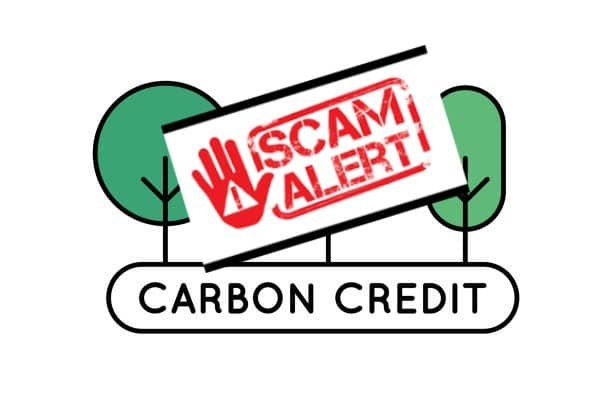If one falls prey to a carbon credit scam, they’re most likely not able to recoup their investment. So it’s crucial to know what to look for when buying carbon credits and avoid the scammers.
Carbon credits are an innovative and effective tool to help abate climate change but scammers abuse them, leaving an impression that they’re not trustworthy.
Scammers often use uncertainties in carbon markets to deceive investors into handing over their money.
In Taiwan, a couple were convicted and sentenced to prison terms for a carbon credit trading scam. They earned over NT$100 million (US$3.31 million) in profits over 2 years.
According to the filings of prosecutors who investigated the case,
“Although Hsu and Yang knew their company was not dealing in ‘carbon credit trading,’ they set up a trading platform to lure investors by promoting the company as engaging in legitimate international schemes for carbon neutralization and the sale of carbon credits… taking advantage of the worldwide trend for renewable energy sources and reducing greenhouse gas emissions.”
Convicted for Carbon Credit Scam
The Hsinchu District Court ruled that Hsu Chu-tsai (67 yrs. old) and his wife, Yang Liang-liang (60) were guilty of financial fraud in violation of the Banking Act.
The couple were the owners of an investment business called Rich Alliance Good Health Co.
The judges sentenced Hsu to 8 years and Yang to 4 years in prison. The court also confiscated their ~NT$100 million of profits and imposed a NT$25 million (US$0.8 million) fine on their firm.
The couple registered their business in 2016 in Hsinchu City to initially market equipment that generate renewable energy and control pollution.
Three years later they ventured into carbon credit trading. They said that international bodies of carbon trading schemes authorized them to do business in the market.
They then lured 78 people from various countries to invest with false promises of high rates of return from the carbon credit trading scheme.
Investors were told to earn up to 4% monthly profits and 18-48% annual profits.
-
The couple also promised them with carbon credits sold for US$3,000 per 300 tonnes reflected in a carbon credit voucher.
Hsu earned the trust of investors by forging his past and current business ties with a German institution and a Singaporean bank.
He also claimed to be authorized to trade on the “London Carbon Credit Exchange.” Apparently, there’s no such London carbon credit exchange that exists.
In the first year, investors received some returns but they began to suffer shortfalls in the second year.
Hsu blamed the losses to the suspension of carbon credit trading in London due to the death of the exchange’ director. But some investors were keen enough to detect a carbon credit scam. They asked help from authorities to investigate the matter.
The fraud caused many investors to suffer huge financial losses. It also tainted Taiwan’s financial system and its regulation as per the ruling.
What can be learned in this carbon credit scam?
- Due diligence from the investors – they must do their homework of confirming that the carbon credit scheme is real.
A Checklist to Avoid a Scam
Here are the things to watch out for when investing in or buying carbon credits to avoid a scam.
High rates of return:
Be wary of promised returns that sound too good to be true. Do a quick research on the range of returns available in the market, which can vary a lot.
Price:
There are different types of carbon credits, depending on the kind of project that generates them. This is crucial to know as prices for carbon credits also vary per type.
Credits from nature-based projects often have higher prices, recently traded at $11.25/tonne. But the average price for a credit is below $4.0. The convicted couple sold the credits for $10/tonne.
Carbon Exchange:
The identified carbon credit exchange must be legitimate and a quick Google search can confirm that. The “London Carbon Credit Exchange” doesn’t exist. Here are the top carbon exchanges in the market.
Carbon Registry:
Though not all carbon credits are the same, they must all be registered in an established carbon standard body. If not, then they’re not validated or verified and so, may not be real.
A carbon credit voucher, or any other proof of receipt of investment, should at least name an international carbon registry that certifies the issuance of the credits.
Evaluation Criteria:
If you’re directly buying carbon credits from developers or traders, you should be aware of what to look for to ensure quality and integrity of the credits.
Here’s our guide on the evaluation criteria that carbon credit buyers can use. Each criterion is discussed to help you choose the best carbon credit to buy and avoid a scam.
On top of it all, refrain from trusting a broker right away without checking the above information. Do your homework first so that you won’t be a victim of a carbon credit scam like what the couple did.
After all, investing in carbon credits can be a lucrative venture as long as you are well-informed.

